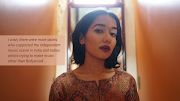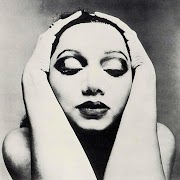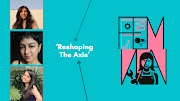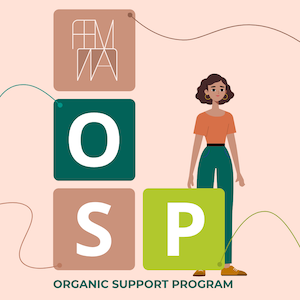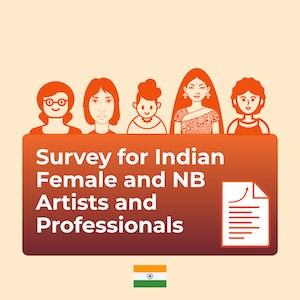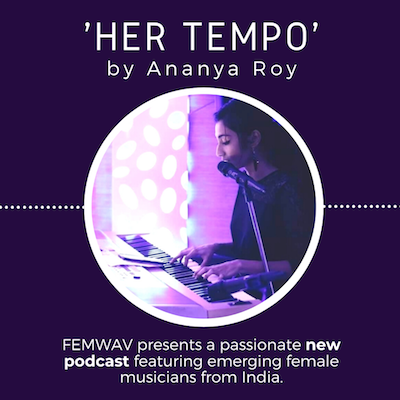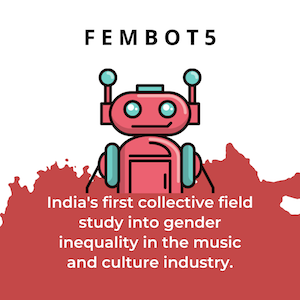 |
| Photo by Saurav Nanda |
Over time, several pathways lead us to Bawari Basanti. It would be fairly unusual for anyone to have a brush with the Indian indie scene and not come across at least one of her numerous collaborative efforts with BoBunFever, Zion Train, GeneralZooZ, Mojojojo, and SeedheMaut. There's also the steady rhythm of her tours and performances to be considered, playing the SofarSounds concert in Delhi, The Gig Week, Tribu Festival in Dijon, France, among others.
The person behind the moniker is Mahima Dayal Mathur - a supremely adept Hindustani Classical singer who has already cultivated a repertoire of songs with biting social commentary, routinely experimenting with marrying her extensive traditional training with contemporary sounds and causes. Her debut EP Underwater continues along the same vein, oscillating between Hindustani classical ragas and more mainstream hip-hop sounds, singing of mental health struggles and the proscriptive nature of spending time outside in India, as women, as lovers, as yourself.
Her email to us earlier this month was, therefore, received with great pleasure by us. Mahima is poised for a 10-city tour come January, including a performance at Goa Sunsplash 2020, as a follow up to Underwater. She is also on the verge of releasing four new songs, "each with its own dramatic mood." Her December performances will include a ton of unreleased material, including the aforementioned tracks. We have an illuminating chat with her about her influences, collaborating with other artists, and turning one's interest in Hindustani Classical music to something more tangible.
There appear to be two facets of your music that often overlap but still make for two very distinct sounds. There are more contemporary hip-hop-adjacent sounds of 'Izehar' and 'Pankh' and then there is the rest of your discography, which is definitely more Hindustani classical. Which do you connect with more, on an artistic level or would you like to perhaps reach a more coherent amalgam of both?
Thats true, I think thats also how I am as as a person, I can express the same feeling in so many different ways or be moody one minute and angry the other. So, obviously there is no one specific way of expressing ourselves.
I enjoy all vibes, as long as they fit the room. I also perform two different kinds of sets. One which is a live Folk set, incorporating a more stripped down version of my songs with a sarangi vadak, Tabla, Keys and guitars and another, is an electronic setup, where I perform these songs solo, using a controller mixing uptempo grooves and creating an overall moody groove for audiences who are looking to dance to some electronic hip-hop folk.
I dont know if there is a more coherent amalgam, but I know if I keep releasing honest music, each track will find its own place in the collage of my moods.
Being a singer-songwriter inadvertently means enlisting other artists to take over music production. Do you find this limiting or does it make it easier to realise your creative vision?
Not at all. Actually I like involving others in the mix, as your ear also starts to become biased towards your own sound after a point. It's always good to have a fresh perspective, especially when most of your musical work is happening is isolation, inside the walls of your bedroom. Getting other musicians and producers to be a part of that sound only takes it to new spaces, you just need to know which space you want to explore.
 |
| Photo: Nikil Jonathan |
I have not collaborated with any female musicians yet. I have collaborated with contemporary dancer, Jivana Nataly who has performed with my music at many shows. I would really like to collaborate with The Aahvan Project (Vedi Sinha), and Komorebi.
Why did you choose to sing in Hindi specifically? Has that worked in your favour thus far or is it a hinderance sometimes?
Sing in any form that makes you stay in touch with your most raw self. Anything which feels like a mask cannot be used to project emotion. It's really not about the language, it's about what I want to say with my music and how can I project that best. In my upcoming release, 'Dawn' I have a verse in English between folkrap lines. I dont think its a conscious choice, it just comes best, the way I lean and practice music.
How does a complete novice make a foray into Hindustani classical music training? Where's a good place to start in terms of gathering information, learning history, doing prep work prior to enrolment - and is enrolment even available to everyone? What are the prerequisites?
If you are a complete novice, then the best way is to first check Youtube tutorials by Anuja Kamath. She will really break down the basics for you in the most beautiful fashion, and the best part is that it's free. Based on these, you can decide if you think this is for you to pursue or not.
You can enrol as a beginner in many places. In Delhi the best schools to learn from are Gandharv, Bhatkhande, Bhartiya Kala Kendra, Triveni Kala Kendra. Each city or town will have its own options to choose from.
I have also started giving online classes for Hindustani music to beginners on an online portal called bmusician. They have a very esteemed list of teachers working with them. If you don't wish to step outside or can't, online classes are a good option.
Who are your musical influences?
While growing up, my grandmother would always play Bhakti Mala volume 1, 2 & 3, almost all the time in her bedroom. These cassettes comprised of bhajans (devotional or spiritual songs from the Indian subcontinent) and songs by amazing artists like Shruti Sadolikar, Bhimsen Joshi, Pandit Rajan and Sajan Mishra and Gundecha Brothers, Kishori Amonkar, Veena Sahasrabuddhe to name a few. Their voices have always been at the back of my head and play a major role in shaping my vocal delivery techniques. I am constantly collecting LPs by my favourite singers. The most recent one I purchased from Pagal Records, was a rare collection of Thumries (a semi-Classical music form that focuses on matters of love) sung by Begum Akhtar.
Now given the access to unlimited music online, I can only mention a few bands and artists that are currently on my playlist. Right now I have a 'Room Cleaning Playlist' on iTunes with artists and bands like Masego, Ali Sethi, Nicholas Jaar, Tajdar Junaid, Zaib and Haniya, Peter Cat Recording Co., Shubha Mudgal, Tierra Whack, The Black Keys, and Vulfpeck.
 |
| Photo: Saurav Nanda |
It would be fantastic if you could help us introduce the world to Hindustani classical music or even its more contemporary or experimental interpretations. You could list 3 or 5, and please do let us know why you chose them. It would be even more helpful if you could try to pick music by women / queer / non-binary musicians.
Women who I feel have used their classical training and vocal techniques, to create something alternative:
Sulk Station (Tanvi Rao)
Maati Bani (Nirali Kartik)
Aditi Ramesh
Shadow and Light (Pavitra Chari)
You can see Mahima perform live tomorrow, Saturday November 16, 2019 for Spacesession Delhi at Designkari. Details and spot registration here.
Written by Uvika Wahi



